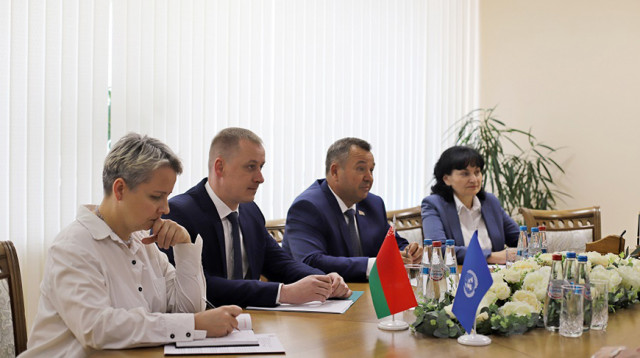
MINSK, 27 July (BelTA) - The Ministry of Natural Resources and Environmental Protection outlined areas for further cooperation with UNDP, BelTA learned from by the press service of the Ministry of Natural Resources and Environmental Protection of Belarus.
Minister of Natural Resources and Environmental Protection Andrei Khudyk met with the outgoing UNDP Resident Representative in Belarus Alexandra Solovieva. The parties summed up the results of joint work and identified specific prospects for further cooperation between the Ministry of Natural Resources and Environmental Protection and UNDP in addressing environmental issues.
The press service noted that for 30 years Belarus has attached great importance to cooperation with UNDP in the field of environmental protection, rational use of natural resources, mitigation of climate change, development of green and circular economy. These areas are reflected in the UNDP Country Programme for Belarus for 2021-2025 implemented in partnership with government bodies, including the Ministry of Natural Resources and Environmental Protection.
"The Ministry of Natural Resources and Environmental Protection will continue to seek the closest relations with UNDP to ensure the highest possible level of environmental protection and rational use of natural resources," Andrei Khudyk said. “Today we are concerned about the current situation in the world when environmental issues are sacrificed for economic development. In implementing its social and economic policy, Belarus strives to ensure a balance between achieving the prosperity of the country and people and the need to preserve natural resources and ecosystems."
The parties noted the productivity of cooperation and elaborated on some of the results. These include the development of a detailed economic model of greenhouse gas emissions and a unified register of environmental information, the removal of 1,320 tonnes of POPs-containing waste and restoration of more than 13,500 disturbed and degraded peatlands.
Today, UNDP and the Ministry of Natural Resources and Environmental Protection continue to implement three joint projects on persistent organic pollutants, reporting and verification of CO2 emissions, and the development of eco-tourism.
For her part, Alexandra Solovieva noted that the partnership between UNDP and the Ministry of Natural Resources and Environmental Protection is systemic and comprehensive, where environmental aspects simultaneously include economic solutions, the development of a green and circular economy, small business, ecotourism, and agriculture.

The parties outlined areas for further cooperation, which include the development of a circular economy strategy, measures to counter land degradation, climate change and adaptation to its consequences, the withdrawal of ozone-depleting substances from circulation, and the strengthening of environmental education.